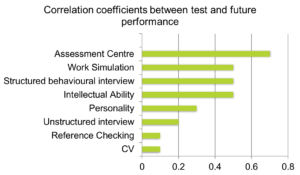Finding and selecting the right people at an organisation is often one of the most important responsibilities that a leader will have, and interviewing candidates will almost always be a key component of the recruitment process. Unfortunately, there’s no exact formula to choose the perfect candidate or predict how successful they will be.
- There is strong research, however, that some interview techniques can increase the effectiveness of the interview process:
- Use a structured interview and rating system. Several studies on assessment methods, including most famously by Hunter and Schmidt, have shown that using set questions as part of a structured interview drastically increases your ability to choose the right candidate. While it might feel more natural to “have a chat” and that can form part of the discussion, it’s important to have pre-prepared questions that are consistent across candidates and a system of being able to rate responses.
- Questions should be “competency-based”. Past behaviour is one of the best predictors of future behaviour, and competency-based questions ask a candidate about how they’ve approached real scenarios in the past. Questions like “tell me about a time when you built an effective work relationship” will tell you more about someone’s approach than asking them to describe how they would do it hypothetically.
- Use additional tools. Hunter and Schmidt’s research also tells us that the ability to predict candidate success also increases by selective use of other tools in the recruitment process. Carefully chosen intellectual ability tests and personality questionnaires can help validate interview responses and also provide areas that should be probed in an interview.
-
- Be aware of interviewer bias. You may have heard of unconscious bias related to a candidate’s gender, race or age and it’s important to take steps to counteract the effects of bias. For example, some larger organisations remove candidate names from CVs. There are also other biases that can affect interviewers such as “confirmation bias” where an interviewer has an existing belief about someone and they put greater emphasis on things that support that belief and less emphasis on things that don’t. The first step to minimising bias is identifying any bias you may have and then address the effect this may have on the interview.
Pilot testing: As an interviewer, conducting a pilot test on your interview structure could also help you conduct an effective interview. Pilot testing involves gathering a small group of people and testing out your interview structure and getting feedback from them, which would be analysed to identify any flaws with the interview structure and the potential to improve on the structure.

